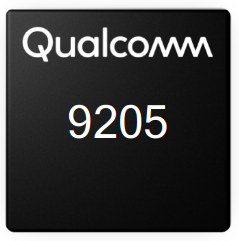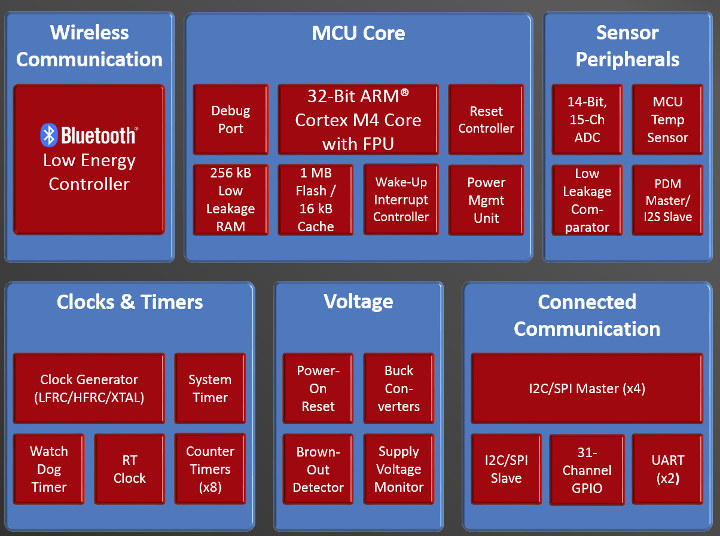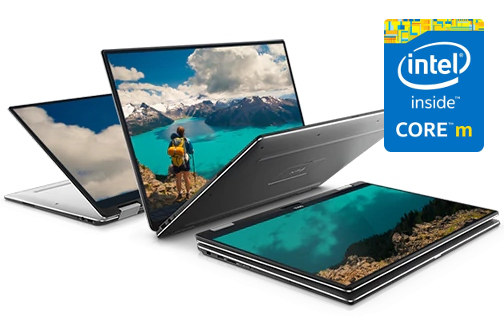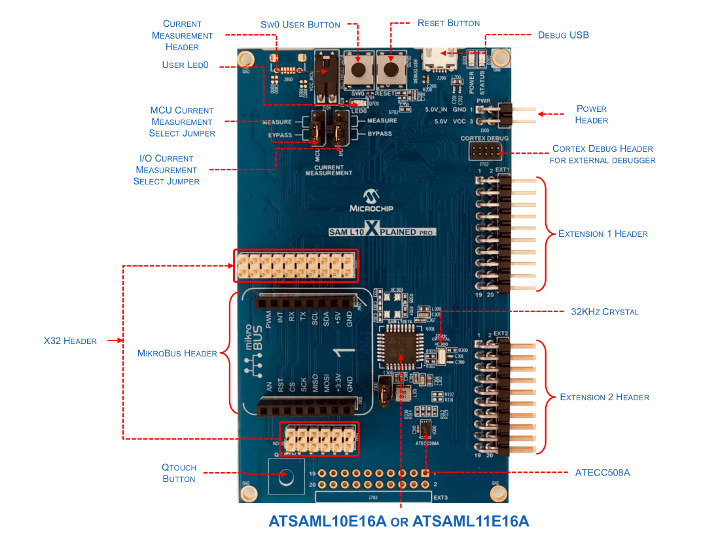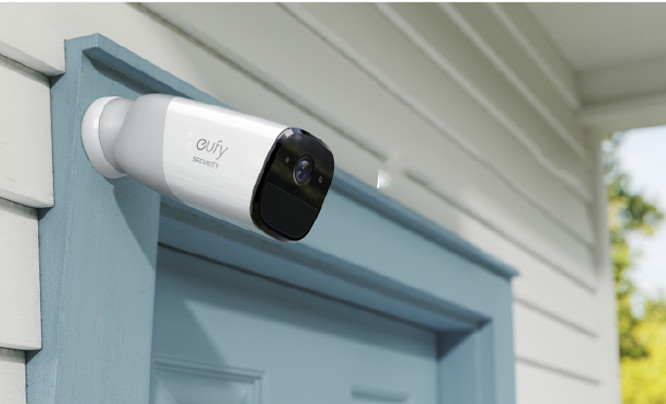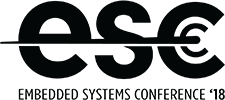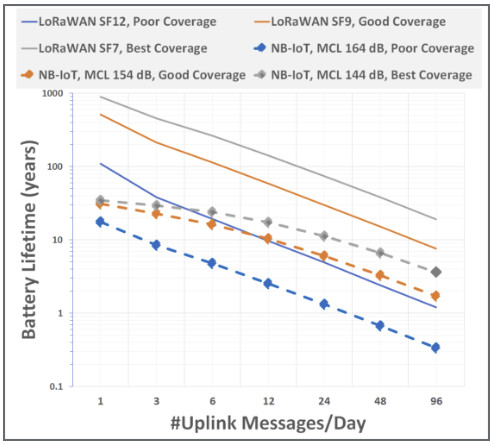Qualcomm has introduced a new LTE IoT chipset with Qualcomm 9205 LTE modem that supports Cat M1 (eMTC), NB2 (NB-IoT), 2G/E-GPRS fallback, as well as GNSS. Qualcomm 9205 comes at a lower price, smaller footprint, and up to 70% lower power consumption in standby mode compared to its predecessor (MDM9206). Qualcomm 9205 LTE modem key features and specifications: Processor / OS – Arm Cortex A7 up to 800MHz with support for ThreadX and AliOS Things real-time operating systems Connectivity Standards 3GPP release 14 Category M1 and NB2; 2G/E-GPRS fallback where Cat M1 / NB2 is not available. Category M1 mode supports voice for applications such as monitored security panels, and mobility for applications such as asset trackers. RF transceiver Bandwidth support from 450 MHz to 2100 MHz Built-in RF front-end, a first in the cellular IoT space Geolocation Integrated GNSS (Global Navigation Satellite Systems) support for GPS, Beidou, Glonass, and […]
Ambiq Apollo2 Blue Ultra Low Power MCU adds Bluetooth Connectivity
Ambiq Micro unveiled their ultra-low power Apollo MCU back in 2015 with claims of Cortex-M4 performance at Cortex-M0+ energy efficiency by leveraging SPOT (Subthreshold Power Optimized Technology) technology that allows operating the microcontroller at very low voltages (less than 0.5V). Since then the company introduced Apollo2 MCU with 10 μA/MHz power consumption, but still a generic purpose microcontroller. Earlier this year, the company unveiled a new version of Apollo2 microcontroller adding Bluetooth connectivity, and allowing Bluetooth applications that last years on a charge. Meet Apollo2 Blue. Apollo2 Blue key features and specifications: Arm Cortex-M4 Processor up to 48 MHz with FPU, MMU, wake-up interrupt controller with 32 interrupts Ultra-low power memory Up to 1 MB of flash memory for code/data Up to 256 KB of low leakage RAM for code/data 16kB 1 or 2-way Associative Cache Bluetooth 5 Low Energy RF sensitivity – -95 dBm TX: 5mA @0 dBm; RX: […]
$100 GLIGO E-Ink Smartwatch Promises “2-Year Battery Life” (Crowdfunding)
Wearables are useful little devices, but many of them suffer from short battery life, and in my case at least, I forget to charge mine from time to time. So when I saw GLIGO E-Ink smartwatch promising 2-year battery life on a charge, it caught my eyes. But then looking into the details, it looks like battery life is really 6 months unless you don’t plan on using the display: We adopted an energy-efficient dual-core design:the quartz core has a battery life of up to two years, e-ink screen has a battery life of up to 180 days. Six months is not that bad either, so let’s still have a look. GLIGO E-Ink smartwatch specifications: MCU – Unamed Arm Cortex M3 microcontroller with 128KB memory Display – E-ink segmented display Japanese Watch Movement Connectivity – Bluetooth 4.2 LE Sensors – Green light heart rate sensor (HRM), 3D G-sensor, 3-axis accelerometer […]
Three 5W Intel Amber Lake Processors Coming Soon: Core m3-8100Y, Core i5-8200Y, Core i7-8500Y
When I talk about low power Intel processors, I usually think about atom-based families like Bay Trail, Cherry Trail, Apollo Lake or Gemini Lake with 2W to 10W processors that delivers entry-level performance at a reasonable price. But Intel has also been selling more powerful Core-m processors with a similar power budget, but with much better performance, at the cost of a significantly higher price tag. The company is now prepping to launch a new family of such processor with Amber Lake Y-series (aka Amber Lake-Y) family. Three Amber Lake processors are expected to be officially announced very soon: Core m3-8100Y dual core/quad thread processor @ 1.1 GHz (base) / 3.4 GHz (turbo) Core i5-8200Y dual core/quad thread processor @ 1.3 GHz (base) / 3.9 GHz (turbo) Core i7-8500Y dual core/quad thread processor @ 1.5 GHz (base) / 4.2 GHz (turbo) All three processors are manufactured with a 14 nm […]
Microchip Unveils SAM L10 & SAM L11 Arm Cortex-M23 MCU Families with Arm TrustZone for Armv8-M
Microchip has recently announced new SAM L10 and SAM L11 Arm Cortex-M23 MCU families, with the SAM L11 family featuring Arm TrustZone for Armv8-M that provides hardware isolation between certified libraries, IP and application code. SAM L10 & SAM L11 MCU Families Key features: Arm Cortex M23 Core @ 32 MHz Up to 64 KB Flash and 16 KB SRAM picoPower Technology less than 25 μA/MHz in active mode less than 100 nA in sleep mode Fast wakeup time: 1.5 μS Flexible power saving features Enhanced Peripheral Touch Controller (PTC) with improved water tolerance, noise immunity and responsiveness Security (for SAM L11 only) Chip-level tamper resistance Arm TrustZone technology Secure boot Secure bootloader Crypto accelerators Secure key storage Op amp ADC and DAC Package – VQFN32, TQFP32, WLCSP32, VQFN24, SSOP24 Microchip SAM L10 MCU achieved a ULPMark score of 405, or over 200 percent better performance compared to the nearest […]
Eufy EverCam Full HD Waterproof WiFi Security Camera Works for Up to a Year on a Single Battery Charge
Wired security cameras can be troublesome to installed due to the cabling required, but luckily there are solutions to avoid all those long cables with solar powered IP cameras, or battery powered IP cameras. A few years ago I wrote about Immedia Blink WiFi HD camera that claimed to last a year on a charge, and despite several complains on Kickstarter, they seem to still be in business. There’s now a more advanced model by Eufy – an Anker brand – that supports 1080p video recording with motion sensing and face recognition, that also lasts up to one year on a charge, and offers free storage. Eufy EverCam specifications: Resolution – 1080p Video Format – H.264 High profile Image Sensor – Sony Exmor IMX323, 1/2 9-inch Field of View (FoV) – 140° Night Vision Range – up to 10 meters Digital Pan & Zoom – Yes, up to 8x Motion […]
Embedded Systems Conference 2018 Schedule – IoT, Security, Artificial Intelligence, and More
The Embedded Systems Conference takes place each year in Boston, US in April or May. This year, the event will occur on April 18-19, and the organizers have published the schedule with 7 tracks: Advanced Technologies, Center Stage (free), Embedded Hardware Design & Verification, Embedded Software Design & Verification, IoT and Connected Devices, Keynotes (free) and Special Event (free). Even if you can’t attend, it’s always useful to have a look at the schedule to learn about potential industry developments. So I’ve made my own virtual schedule with some of the sessions I found relevant to this blog. Wednesday, April 18 8:00 – 10:00 – An Introduction to RTOS by Jean Labrosse (Software Architect, Silicon Labs) This tutorial will help you understand what RTOSs are and how they work so that you can make better use of their features. The class will explain what an RTOS is and why you […]
A Look at LoRaWAN and NB-IoT Power Consumption
LoRaWAN and NB-IoT are both designed for low power long range communication for the Internet of Things. We’ve previously seen both protocols have about the same 15km range in rural areas, and NB-IoT bitrate is a little higher since it can reach around 100 kbps, against 300 bps to 38.4 kbps for LoRaWAN. All LPWAN standards usually claim 10-year battery life, but it would be interesting to get some data about power consumption, and that’s exactly what AMIHO Technology has done by comparing LoRaWAN to cellular IoT (NB-IoT / eMTC) power consumption. They started by checking public information from datasheets, and compare Tx, Rx, Idle and Tx current for the three standards, and LoRaWAN is about three to five times more efficient in terms of current compared to NB-IoT, and as expected even more compared to LTE Cat-M1. They then went on to compare airtime for the different power states, […]


